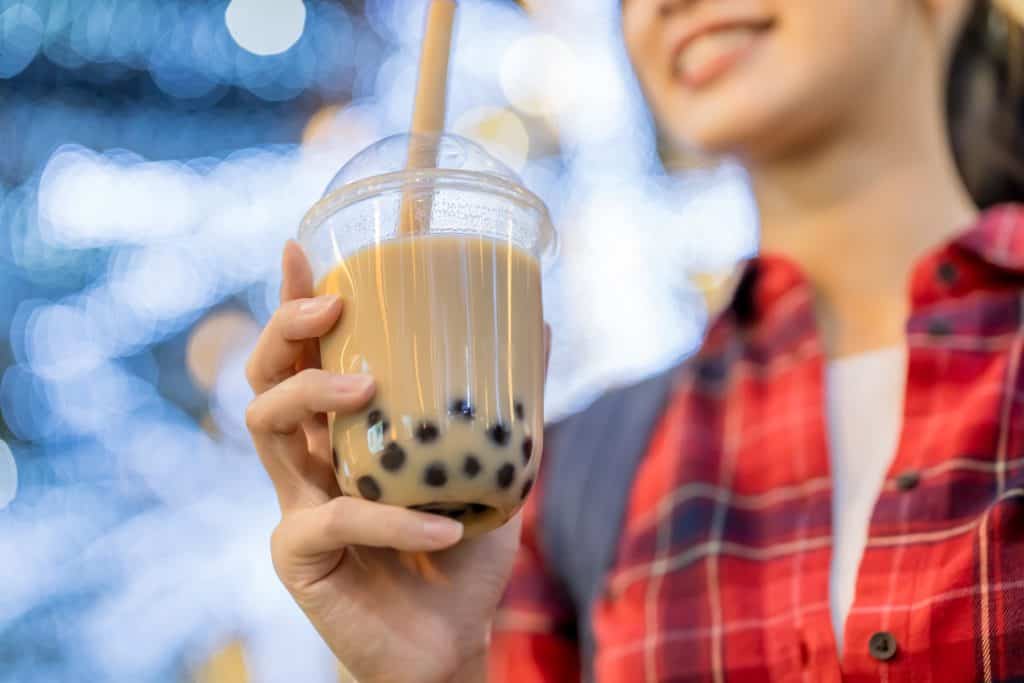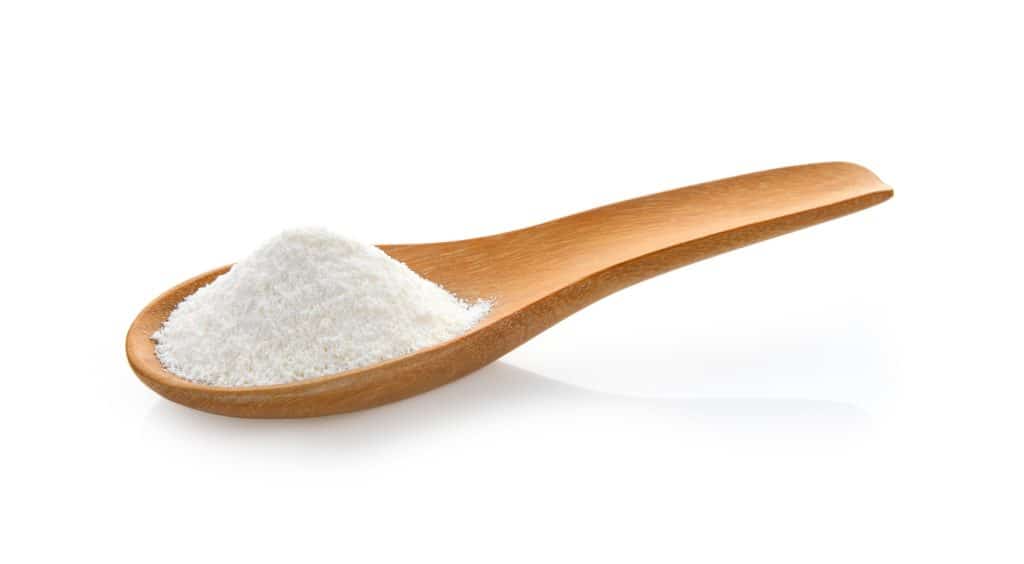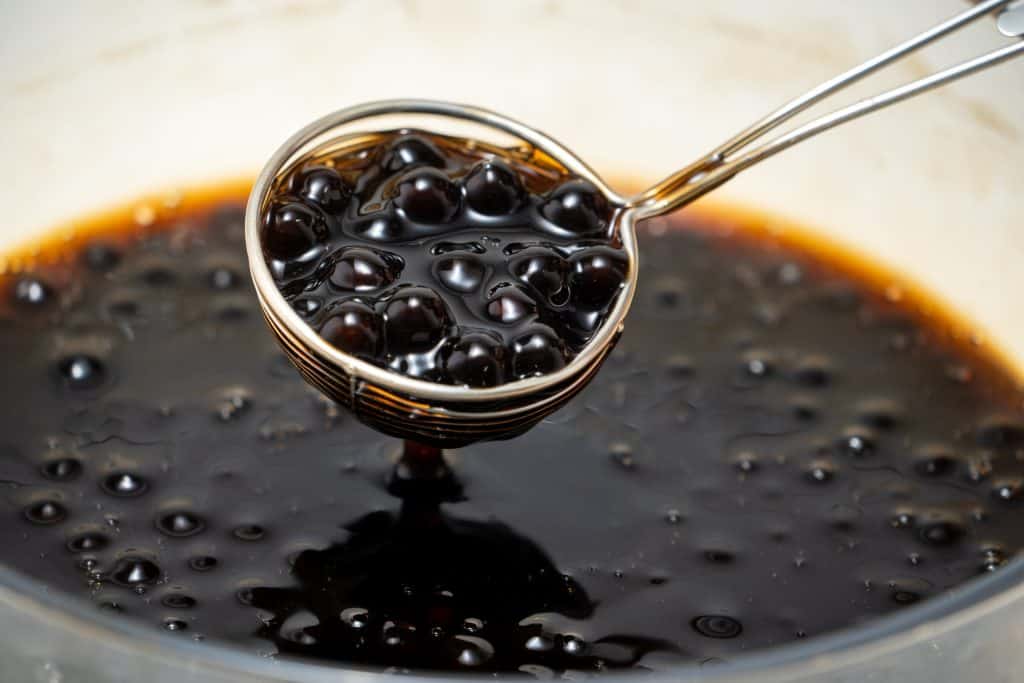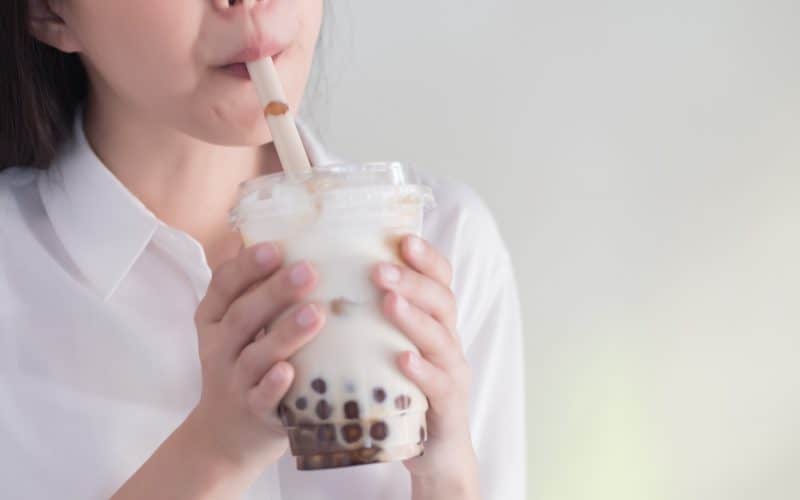Bubble tea is a nice, delicious drink that’s perfect to cap off a long day at work. It’s pretty popular around the world – you may even be a fan already – but can pregnant women have bubble tea? Is it safe for them, or will you be forced to put the habit off for the next few months?
Bubble tea is safe for pregnant women, but not when enjoyed in excess. The most common ingredients in bubble tea aren’t very healthy – we’ll go into greater detail on that below.
- Tea – high in caffeine.
- Creamer – may be high in fat, or contain artificial components.
- Tapioca – contains linamarin, which may induce birth defects in excess.
- Sweeteners – too much sugar.
If they’re using other ingredients, make it a point to look those up beforehand – just to play it safe. Generally speaking though, it’s fine for pregnant women to enjoy some bubble tea.
Bubble tea is a great drink for pregnant women to enjoy, but be mindful of ingredient concentration. Too much caffeine will lead to different health issues than having too much creamer, but both outcomes are very much undesirable for pregnant women.
Bubble Tea While Pregnant (Ingredients Breakdown)
Bubble Tea

Bubble tea is a lovely drink that typically consists of some form of tea, creamer (often milk), sweetener, and tapioca pearls. They can also come with other potential yummy additions like fruit juices, powdered flavorings, purees, or even herbal supplements.
From a clinical basis, there’s no objective consensus regarding how bubble tea affects pregnancy. This is mostly because bubble tea is far from standardized – it’s much more important to track the ingredients in use, then limit their consumption accordingly. Be sure to consult your doctor first, since they’re sure to provide crucial information on how to proceed with your pregnancy.
Caffeine
Pregnant women can drink bubble tea, but their caffeine intake needs to be limited.
Some common teas, such as black tea and green tea, contain relatively high levels of caffeine. Most other herbal teas don’t have this issue and will make for healthier bubble tea bases.
Among them, we highly favor the following herbal teas:
- Ginger tea
- Chamomile tea
- Buckwheat tea
- Peppermint tea
Too much caffeine has been linked to a higher rate of miscarriage and low birth weight, Too much caffeine will also make the mother’s experience less pleasant as well, as the chemical increases both heart rate and blood pressure – in turn, putting even more strain on their organs.
Thankfully, mothers can have caffeine in moderation without suffering from these effects. A cup of caffeinated bubble tea is fine once in a blue moon – but don’t make a habit of this.
Creamer

Bubble tea also makes use of some form of milk or creamer base, which may or may not be high in fat. High-fat creamers (or whole milk) aren’t ideal for pregnant women, as these are full of bad saturated fats that contribute to heart disease and weight gain.
This, in turn, increases the chance of causing fetal overgrowth, which can not only cause birthing complications but may lead to metabolism issues for the child down the line.
Try to use low or zero-fat creamers (or skim milk) to mitigate this concern in the long run.
Tapioca

The tapioca balls might be the best part of bubble tea, but it needs to be prepared very carefully. Cassava, the plant tapioca is derived from, naturally builds up a concentration of linamarin, a chemical that converts into cyanide in the body when metabolized.
The processing of tapioca pearls thankfully curbs this chemical, but botched food preparation may lead to linamarin being retained, which can cause symptoms like abdominal pain or vomiting.
Realistically, your chief concern with tapioca balls will be constipation – this isn’t dangerous, but it’s very uncomfortable to deal with while pregnant. Tapioca balls are also made with lots of sugar, so be sure to consider this while mulling over your dietary situation.
Sugar
High sugar intake also has adverse health effects for both mother and child, increasing the risk of difficult diseases such as gestational diabetes, obesity, and even nerve damage. If your bubble tea is overwhelmingly sweet, stop drinking it – the sugar concentration must be way too high.
Too much sugar isn’t just a problem for pregnant women though. Thankfully, most bubble tea shops let you specify the sugar level of your order. Dial it down to a modest level at minimum (20%), though it’d be much healthier to take it sugar-free. You could also request that they use healthier sugar substitutes instead, such as stevia.
Do note that taking too much stevia is also bad for you, causing symptoms like nausea, low blood pressure, or even kidney damage. The threshold for this is much more forgiving than sugar, and most people won’t hit this dangerous point unless they actively try to.
Final Thoughts
Pregnant women can have bubble tea safely, but you need to keep the ingredients in mind. Specifically, you want to avoid as much caffeine, fat, and sugar as you can manage. Indulging in a warm cup of hot chocolate could be a comforting alternative to bubble tea, offering a sweet treat without the caffeine and other potential risks associated with bubble tea ingredients.
Lastly, it might also be a good idea to pass on tapioca pearls for now – they’re usually safe to eat, but the rare exceptions will wreak havoc on your pregnancy plans.
